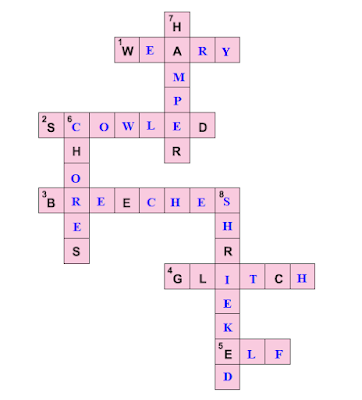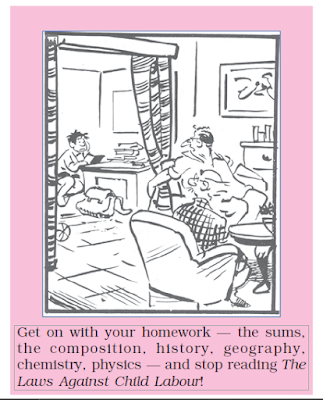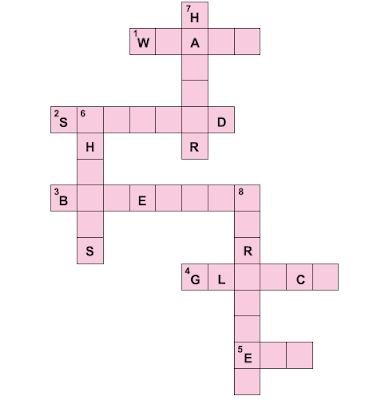Who Did Patrick's Homework
Glossary
| Word | Urdu Meaning | Explaination |
|---|---|---|
| Nintendo | ایک کھیل جو ٹیلی ویژن پر کھیلا جاتا ہے | a video game |
| Ignoramus | جاہل غمنڈی آدمی | an ignorant person who lacks education |
| Britches | لنگوٹ | breeches, or short trousers. The writer here spells it, for fun, to rhyme with the word 'witches' |
| Dishcloth | رام توری | a cloth used for washing dishes |
| Hamper | ڈھکن والی ٹوکری | a basket with lid |
| Grimaced, scowled | چہرے پر غصہ ہونا | face/forehead showed disgust, anger and disapproval |
| Glitch | میشین میں کوئی خرابی ہونا | a fault in a machine that prevents it from working properly; malfunction |
| Shriek | پتلی آواز میں زور سے چیخ مارنا | ti give a short, high-pitched cry |
| Nag | پیچھے پڑنے والا | one who troubles someone all the time by complaining or asking them to do something |
| Drag | بہت ہی بُری یا نا پسند چیز | something dull and uninteresting |
| Bleary | بہت باریک، یا نا صاف | dim |
| Slyly | چوری چھپے | secretively |
| Chores | روز مرہ کیا جانے والا کام | work that must be done everyday, often boring |
| Attitude | کسی چیز یا کسی شخص کا احساس ہونا | a feeling about someone or something |
Working With The Text
1. What did Patrick think his cat was playing with? What was it really?
Ans: Patrick thought that his cat was playing with a little doll. It was, in fact, a very small-sized man, an elf.
2. Why did the little man grant Patrick a wish?
Ans: Patrick had saved the tiny man’s life from the cat. So he promised to fulfil one wish of Patrick.
3. What was Patrick’s wish?
Ans: Patrick's wish was that the little man should do all his homework till the end of the session.
4. In what subjects did the little man need help, to do Patrick’s homework?
Ans: The little man needed Patrick’s help in maths, English and history.
5. How did Patrick help him?
Ans: Patrick sat beside the little man and guided him. He brought books from the library and read out to him.
6. Who do you think did Patrick’s homework – the little man, or Patrick himself? Give reasons for your answer.
Ans: It was Patrick himself who actually did all the homework. He had to help the elf again and again with guidance and books.
Ans: Patrick thought that his cat was playing with a little doll. It was, in fact, a very small-sized man, an elf.
2. Why did the little man grant Patrick a wish?
Ans: Patrick had saved the tiny man’s life from the cat. So he promised to fulfil one wish of Patrick.
3. What was Patrick’s wish?
Ans: Patrick's wish was that the little man should do all his homework till the end of the session.
4. In what subjects did the little man need help, to do Patrick’s homework?
Ans: The little man needed Patrick’s help in maths, English and history.
5. How did Patrick help him?
Ans: Patrick sat beside the little man and guided him. He brought books from the library and read out to him.
6. Who do you think did Patrick’s homework – the little man, or Patrick himself? Give reasons for your answer.
Ans: It was Patrick himself who actually did all the homework. He had to help the elf again and again with guidance and books.
Language Work
A. Fill in the blanks in the sentences below with the words or phrases from the box. (You may not know the meaning of all the words. Look such words up in a dictionary, or ask your teacher.)| out of luck | semester | mystery | between you and me |
| true to his word | chores | look up |
1. Some people find household _________________ a boring, but I like to help at home.
2. Who stole the diamond is still a _______________.
3. This _______________ we are going to have a class exhibition.
4. _________________ the elf began to help Patrick.
5. Can you ————————————— this word in the dictionary?
6. I started early to be on time, but I was ———————————. There was a traffic jam!
7. She says she’s got a lot of books, but ———————————— I think most of them are borrowed.
Answer:
1. Some people find household chores a bore, but I like to help at home.
2. Who stole the diamond is still a mystery.
3. This semester we are going to have a class exhibition.
4. True to his word, the elf began to help Patrick.
5. Can you look up this word in the dictionary?
6. I started early to be on time, but I was out of luck. There was a traffic jam!
7. She says she’s got a lot of books, but between you and me I think most of them are borrowed.
B.Use the clues given below to complete this crossword puzzle.
Across
1. very tired
2. had an angry look on the face
3. short trousers
4. a fault in a machine that prevents it from working properly
5. a small and naughty boy-fairy
Down
6. work that must be done everyday, often boring
7. a basket with a lid
8. gave a short, high-pitched cry
Answer:
1. very tired
2. had an angry look on the face
3. short trousers
4. a fault in a machine that prevents it from working properly
5. a small and naughty boy-fairy
Down
6. work that must be done everyday, often boring
7. a basket with a lid
8. gave a short, high-pitched cry
Answer:

Grammar Work
I. Join the following pairs of clauses by using and/but/or:
| Pair 1 | Pair 2 |
|---|---|
| i) a. Lata is a singer | b. She is very smart |
| ii) a. Mehmood is from Jammu | b. Rafiq is from Kashmir |
| iii) a. He is from the city | b. He is very simple |
| iv) a. Jitendar is an actor | b. His wife doesn't work |
| v) a. Be quiet | b. You'll be thrown out |
vi) a. I stayed at home |
b. I watched television |
vii) a. I bought a book |
b. I didn't read it |
i. Lata is a singer and very smart.
ii. Mehmood is from Jammu but Rafiq is from Kashmir.
iii. He is from the city but he is very simple.
iv. Jitender is an actor but his wife doesn't work.
v. Be quiet, or you will be thrown out.
vi. I stayed at home and watched television.
vii. I bought a book but didn't read it.
II. Choose the correct word:
I. Apples is/are grown everywhere in Kashmir.
Ans. Apples are grown every where in Kashmir.
II. Bananas aren't/isn't grown in Kashmir.
Ans. Bananas aren't grown in Kashmir.
III. My hands is/are cold.
Ans. My hands are cold.
IV. Who is/are those men?
Ans. Who are those men?
V. Your jeans are/is dirty.
And. Your jeans are dirty.
VI. Where is/are my glasses?
Ans. Where are my glasses.
VII. My feet is/are cold.
Ans. My feet are cold.
VIII. Is/are the shops open?
Ans. Are the shops open?
IX. Your coat is/are good.
Ans. Your coat is good.
X. Where are/is the children?
Ans. Where are the children?
Ans. Apples are grown every where in Kashmir.
II. Bananas aren't/isn't grown in Kashmir.
Ans. Bananas aren't grown in Kashmir.
III. My hands is/are cold.
Ans. My hands are cold.
IV. Who is/are those men?
Ans. Who are those men?
V. Your jeans are/is dirty.
And. Your jeans are dirty.
VI. Where is/are my glasses?
Ans. Where are my glasses.
VII. My feet is/are cold.
Ans. My feet are cold.
VIII. Is/are the shops open?
Ans. Are the shops open?
IX. Your coat is/are good.
Ans. Your coat is good.
X. Where are/is the children?
Ans. Where are the children?
Let's Talk
A. In the story Patrick does difficult things he hates to do, because the elf pretends he needs help. Have you ever done something difficult or frightening, by pretending about it in some way? Tell your classmates about it.
Or
Say what you feel about homework. (The words and phrases in the boxes may help you.) Do you think it is useful, even though you may not like it? Form pairs, and speak to each other.
For example:
You may say, “I am not fond of homework.”
Your partner may reply, “But my sister helps me with my lessons at home, and that gives a boost to my marks.”
Answer:
I: I am not fond of reading books.
My partner: But my brother told me that reading books gives a boost to your vocabulary.
I: My friend is not so keen on scoring good grades in the exams.
My partner: But my sister said that she would assist me in my lessons to score well in the exams.
I: I have not developed a liking for playing football.
My partner: But my cousin assured me that he will help me to learn how to play football.
I: My younger brother has taken to playing chess.
Or
Say what you feel about homework. (The words and phrases in the boxes may help you.) Do you think it is useful, even though you may not like it? Form pairs, and speak to each other.
For example:
You may say, “I am not fond of homework.”
Your partner may reply, “But my sister helps me with my lessons at home, and that gives a boost to my marks.”
Answer:
I: I am not fond of reading books.
My partner: But my brother told me that reading books gives a boost to your vocabulary.
I: My friend is not so keen on scoring good grades in the exams.
My partner: But my sister said that she would assist me in my lessons to score well in the exams.
I: I have not developed a liking for playing football.
My partner: But my cousin assured me that he will help me to learn how to play football.
I: My younger brother has taken to playing chess.
| (not) be fond of | (not) take to | (not) develop a liking for |
| (not) appeal to | (not) be keen on | (not) have a taste for |
| support | assist | with the aid of |
| help | be a boon | give a boost to |
My partner: But my brother does not support me to play indoor games.
I: I have appealed to my Physical Training teacher to allow me a day’s break from the drill session.
My partner: But playing outdoor games can be a boon for your health.
I: I have always had a taste for delicious food.
My partner: But my mother says that I should clean my bare hands with the aid of soap and water before touching the food.
I: I have appealed to my Physical Training teacher to allow me a day’s break from the drill session.
My partner: But playing outdoor games can be a boon for your health.
I: I have always had a taste for delicious food.
My partner: But my mother says that I should clean my bare hands with the aid of soap and water before touching the food.
Let's Write
Question A:
This story has a lot of rhyming words, as a poem does. Can you write out some parts of it like a poem, so that the rhymes come at the end of separate lines?
For example:
Patrick never did homework. “Too boring,” he said.
He played baseball and hockey and Nintendo instead.
Answer:
Question B:
Look at these sentences.
1. “Too boring,” he said.
2. Cleaned his room, did his chores.
When we speak, we often leave out words that can easily be guessed. We do not do this when we write, unless we are trying to write as we speak (as in the story).
So, if we were to write carefully, we would say:
Read the sentences carefully.
Question C:
Rewrite the following incomplete sentences carefully, so that the reader does not have to guess what is left out.
1. more and more books
2. too difficult
3. got up late, missed the bus
4. solved the mystery
Answer:
1. My sister loves reading more and more books.
2. Maths is too difficult to understand.
3. Last Friday, my brother got up late, he missed the bus for college.
4. The detective solved the mystery of the crime scene.
Question D:
Look at this cartoon by R.K.Laxman. Read the sentence given below the cartoon. Discuss the following questions with your partner.
This story has a lot of rhyming words, as a poem does. Can you write out some parts of it like a poem, so that the rhymes come at the end of separate lines?
For example:
Patrick never did homework. “Too boring,” he said.
He played baseball and hockey and Nintendo instead.
Answer:
- The man of the smallest size
- Patrick loved to play sports, not work
- The elf promised to help and wore a high tall hat
Question B:
Look at these sentences.
1. “Too boring,” he said.
2. Cleaned his room, did his chores.
When we speak, we often leave out words that can easily be guessed. We do not do this when we write, unless we are trying to write as we speak (as in the story).
So, if we were to write carefully, we would say:
- “Homework is too boring,” he said.
- He cleaned his room and did his chores.
Read the sentences carefully.
Question C:
Rewrite the following incomplete sentences carefully, so that the reader does not have to guess what is left out.
1. more and more books
2. too difficult
3. got up late, missed the bus
4. solved the mystery
Answer:
1. My sister loves reading more and more books.
2. Maths is too difficult to understand.
3. Last Friday, my brother got up late, he missed the bus for college.
4. The detective solved the mystery of the crime scene.
Question D:
Look at this cartoon by R.K.Laxman. Read the sentence given below the cartoon. Discuss the following questions with your partner.
- What is it about?
- Do you find it funny? If so, why?
- Do you think a cartoon is a serious drawing? Why or why not?

1. It depicts a father’s concern for the betterment and improvement of his son.
2. Yes, the cartoon exhibits a funny tone. The father orders his son to finish his homework. But he stops the boy from reading the laws against child labour.
3. A cartoon mostly depicts the day-to-day activities of life with funny images. Although the above cartoon is a serious drawing, it draws our attention to a common problem that affects one and all.

.webp)


If you have any doubt, suggestion or question, feel free to contact us.